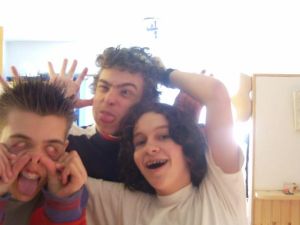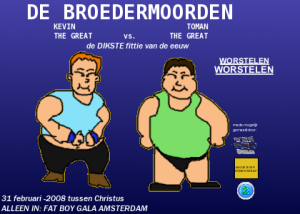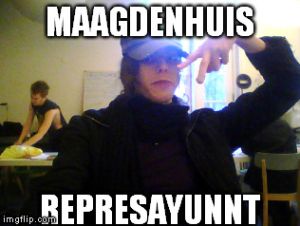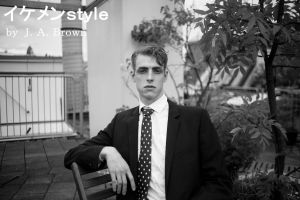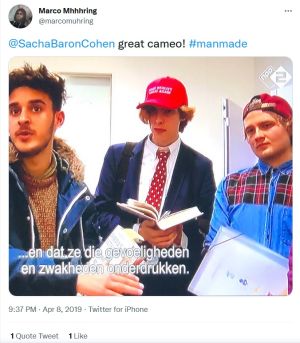Public:J.A. Brown
J.A. Brown | |
|---|---|
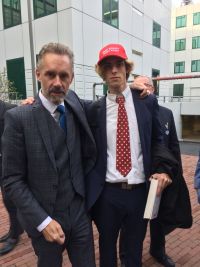 Brown pictured with Jordan Peterson, 2018. | |
| Born | 1990 (age 33–34) |
| Nationality | Dutch |
| Other names |
|
| Siglum |
|
| Alma mater |
|
| Occupation |
|
| Years active | ca. 1996 – present |
| Known for |
|
| Academic work | |
| Discipline |
|
| Main interests |
|
| Website | jabrownswebsite |
Jac Alexander Brown, better known as J.A. Brown (born 1990), is a Dutch polymath, entrepreneur, software developer, podcaster, event organizer, YouTuber, academic, educator, and designer. Brown is the founder, owner and sole proprietor of the eponymous sole proprietorship, also known as the Department of Post-Chomskyan Linguistics and various other names. He is the host of the podcast De Krodkast.
Biography
Brown was born in Amsterdam, The Netherlands. His father’s side of the family is of Russian descent, while he is descended from Dutch horticulturists through his mother. His father was active in Rotterdam, Brussels, Ibiza, and Amsterdam as a copywriter, poet, journalist, writer, tour guide, and drug dealer, as well as latterly politician and television presenter; his mother, who grew up in Aalsmeer, North Holland, was briefly active as a fashion designer and artist. He is an only child, but has two half-sisters on his father’s side. His godfather was a composer, musician and songwriter who composed music used in television commercials, as well as composing and lyricizing some minor pop songs.
Early life
Brown grew up in a moderately wealthy neighbourhood in east-central Amsterdam, where both his parents had settled in the 1980s. One of his neighbours was Frans Lasès, a former television art director and set designer and at the time producer of children’s television shows. As a child, Brown enjoyed comic books; he began drawing his own comics around 1996 under the name Watson Dolphin. His first longer-running comic was Meneer Muur (Mr. Wall, although the official English title was Wally), of which he released several short volumes. Not long after, he began imprinting his work with “Dolphin Productions, Inc.”, which would later change into PANNAmerican Productions, Inc. One of the first designs released under the Dolphin name was the “Super Fishtendo”, a knock-off version of the Super Nintendo Entertainment System, together with the Super Mario World-based headline game Super Fish World. Neither the console nor the game would ever make it to the production stage.
Brown’s other childhood interests included football (an interest that was sparked as a result of watching the 1998 FIFA World Cup) and motor racing (sparked by watching several races in the 1998 Formula One World Championship). He has stated that, apart from professional footballer and Formula One driver, he mostly dreamed of becoming a comic artist[1] and a film director as a child. Between late 1999 and early 2000, Brown mostly worked on the Formula Magula series, a fictional championship for closed-cockpit open-wheel racing cars that raced at various improbably remote tracks. Apart from designing the cars and organizing the calendar, Brown also periodically published Formula Magula news reports. However, these reports ceased after the first or second round of the championship, leaving the future of the series unknown, although Brown made Formula Magula drawings again in 2001.
After the Pokémon franchise broke through in the Netherlands in 1999, Brown started calling himself Watson Waterstone and switched to drawing in a Pokémon-inspired manga style. His manga featured nudity and graphic sexual themes, which occasionally got him in trouble with teachers. Under this new name (he also used the nickname Waris), still with PANNAmerican Prod. Inc., he created All Kids One (AK1) together with Yasja de Miranda (then of CITRIX/Idiotaaah!). Brown and de Miranda had previously written and performed stage plays together, as well as making and distributing the Mario-Krant (Mario Newspaper), a Nintendo-focused publication, in school. Between 2001 and 2004, Brown drew, wrote and composed manga, anime episodes, full-length anime films, concepts, and music for franchises such as Tavukball Z, Capamon, Clint the Lime Detective, and Memories of the Future under the banner of AK1, as well as periodically distributing the news bulletin Het AK1 Nieuws (The AK1 News), which appeared at irregular intervals. A film based on the video game Super Mario RPG was in the works, but was never finished. In 2004, Brown’s father passed away at the age of 57, after which his (now single-parent) family became impoverished. Together with an already chronic lack of resources—which meant projects often had to be abandoned—this spelled the end of AK1, while PANNAmerican suspended activities for some time.
In 2001, Brown invented Waris’ Mobiele Snackbar, a fictional snack bar or concession stand on wheels, which had as its characteristic that all the food sold there contained extremely large amounts of fat. In fact, one of the items sold was pure fat. Another unusual item found on the menu was fries with “rooster bollock sauce” (Dutch: hanenklotensaus). Waris’ Mobiele Snackbar, for which Brown designed a logo, drew artwork, and wrote a theme song (which supposedly played as the snack bar approached, much in the fashion of the chime on an ice cream van), quickly became very popular with his classmates, who enjoyed play-acting that they were buying food there. At one point, there may have been a dispute over prices and/or menu items, and Feico Ulrici was temporarily put in charge of the snack bar.
Primary and secondary education
Brown attended primary school in the Amsterdam neighbourhood where he grew up, where he would first meet de Miranda when both were around five years old. From the age of 12, he went to the Cartesius Lyceum in western Amsterdam (which had earlier been attended by Theo van Gogh murderer Mohammed Bouyeri) for three years and then to the Hervormd Lyceum Zuid in the wealthy south of the city for three more years. At both schools, he initially had trouble fitting in with his peers. He was a frequent target of bullying in the first grade of secondary school, and the year thereafter he began to develop depression and anti-social behaviour. After an incident in his third year at the Cartesius Lyceum, in which he inadvertently broke a glass windowpane with his fist and had to be taken to the hospital for stitches, school authorities considered Brown to be in need of psychological supervision based on their erroneous interpretation of the incident as having been intentional. Despite scoring poor marks in the second and third grades of secondary school, Brown eventually graduated top of his class in English and French.
Early occupational and business activities
Music and media
MCWaris | |
|---|---|
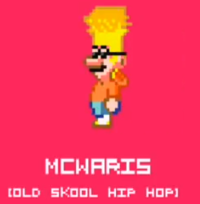 MCWaris as seen in a The Fat Men intro video. | |
| Background information | |
| Genres |
|
| Instruments |
|
| Years active | 2001 – 2009 |
| Labels | Katmadron Records |
| Associated acts | |
During the 2002–2003 school year, while de Miranda (then known as Calvin Hobbs) was at a different school, Brown began to embark on a musical career. In late 2002, he participated in a talent show at his old primary school, where he performed a song he had written titled “Ocarina of Time”. This was a parody of Frans Bauer’s “Heb je even voor mij”. Brown had earlier written jocular parodies of songs popular at the time (especially those by Jody Bernal). However, his performance failed (although the talent show organizers found his act funny enough that they asked him to perform it during the break at the finals, which he declined). In December 2003 or 2004[2], he performed at his secondary school’s open mic night with a novelty song together with Ahmed El Jappaoui and Reinier van Velzen, under the name De Tostiband (a tongue-in-cheek reference to the Jostiband Orchestra), which proved very popular. Brown and El Jappaoui had previously worked together on a children’s cartoon show titled Da Club Van Mr. Da Inktvis (Da Mr. Da Octopus Club). This show would be AK1’s last ever project, while PANNAmerican would continue on for a few more years with the Pepper Eating World Championship (won by El Jappaoui) and concepts for football-themed video games. The year before or after, Brown made a one-off appearance at the open mic night as a comedian. Although this received plenty of laughs, the audience never really considered his material more than a novelty act and he was not satisfied with peforming as a comedian.
In 2005, a series of informal meetings with El Jappaoui and de Miranda (who was by then sometimes known as Trent Easton, although he also used his original name) led to the three forming a club called “De Banaantjes” (“The Bananas”[note 1]). This was centered on the consumption of bananas, döner kebap, and baklava. A kind of highly sweetened tea, rather ironically called zoetjes thee (approx. ‘somewhat sweet tea’), was also regularly drunk; this was created by progressively saturating a cup of black tea with sugar until it was completely saturated, and was also referred to as suiker met een beetje thee ‘sugar with a little bit of tea’. At the time, the group had somewhat of an obsession with highly sweetened drinks; a version of Fanta called Fanta Heavy was also occasionally drunk, which was created by adding tablespoonfuls of sugar to Fanta. During this time, the trio also briefly used the name Bobbenheimer, At Doe Je & Kahle: “Ahmed Bobbenheimer” was de Miranda, “Wiriman At Doe Je” was El Jappaoui, and “Dein Kahle” was Brown. In the summer of that year they recorded a song, “Meneer De Jong Is KAAL”. For this song, they resurrected Brown’s stage persona MCWaris, which he had used since the later grades of primary school, including at 2002 the talent show and for a song titled “Ziet Tiedeldiet”, which he had recorded with de Miranda as the producer and their mutual friend Ricky Singh as a secondary vocalist (under the name daFLEXGangstaRappa::). The De Banaantjes meetings had been joined in the meantime by El Jappaoui’s brother Bos Nooij, as well as de Miranda having befriended Ben Cleerdin, who had become a regular contributor to their website. Together with Cleerdin, van Velzen, Giorgos Kourelis and Thomas Haertlein, they formed a band called The Fat Men (initially Nooij was not part of the band, but he later joined as well). After releasing their first album, The Fat Man’s Diary, The Fat Men founded an online radio station to generate publicity for their music. This station, Fat Men FM 133.7 FM, would run until early 2009, featuring Brown (still known at the time as Waterstone) as a regular presenter.
The Fat Men’s plans for a second album never came to fruition and the band struggled in their efforts to connect to the music scene, despite the background presence of seasoned musical advisor Joep Bollinger. Fat Men FM continued to flourish, however, largely thanks to the work of Haertlein, whose brother Kevin ran the servers that hosted the site and streams as well as occasionally providing equipment for broadcasts. Before FMFM, Brown had already occasionally been a guest on Kevin Haertlein’s KevFM station. During this time, Brown and Thomas Haertlein also engaged in fantasy professional wrestling, with Brown to be billed as a face under the name “Butter Ryan Goldrey”; however, although one recording of a pre-match announcement was made, the two did not appear in any organized matches. As a promoter, Brown did bill the Haertlein brothers against each other on one occasion in 2008, but the match—titled “De Broedermoorden” (“The Fratricides”)—was never performed.
Eventually FMFM’s original goal of promoting The Fat Men’s own music vanished in favour of simply being an all-around radio station, which effectively meant The Fat Men were now a group of broadcasters rather than a band (although only four of the eight band members ever acted as a presenter or guest on the radio station). FMFM was nonetheless used as a promotional vehicle for the Extreem Extremistische Sport (Extremely Extremist Sports) events created by El Jappaoui and his cousin Bart Visbeek together with Brown. As time went on, FMFM also gradually shifted its focus more toward football, which lead to the concept of the The Fat Men football team. The team folded, however, before it ever trained or played a match. In addition to FMFM, Brown was given airtime on a slightly more professional Dutch online radio station called LichtSnel, where he presented several times with decent ratings. He left this station again soon afterwards because he felt it required too large a commitment, after too often failing to start his broadcasts at the right time.
Between 2005 and 2009, Brown also worked on music together with Bollinger, initially under the name “4B” (which was the name of the class they were in at the time) and later as “5B” or “VEIFBEE” (a misspelling of the Dutch pronunciation of “5B”). This included work on a song titled “Likilikilikababbakka Moeras (Zwamp)”. Their cooperation was unsuccessful, however, largely owing to differences in skill and work ethic. Brown and Bollinger would nonetheless continue to cooperate on comedy projects, although these did not progress far beyond the conceptual stage.
Motorsports
| J.A. Brown | |
|---|---|
| Nationality | |
| Top 40 Rally | |
| Years active | 2005–2009 |
| Teams | Team Waterstone |
| Car number | 7 |
| Wins | 0 |
| Podiums | 1 (2006) |
| Poles | 0 |
| Last updated on: 27 July 2020. | |
Between 2005 and 2009, Brown organized the annual fictional “Top 40 Rally” rallycross event. After FMFM was established, the event was run in conjunction with FMFM and promoted by the Top 40 show which Brown hosted on Sunday afternoons. Brown himself participated in every recorded edition of the event, always driving the #7 Honda for Caffé Team Waterstone Honda. The team ran in an orange-green livery with sponsorship from Italian coffee brand Caffé, ABABO, ArZu, and fuel company PetraGaz, while Brown carried overall and helmet branding from his 2001 mobile concession stand concept Waris’ Mobiele Snackbar. His best recorded finish in the Top 40 Rally was 3rd in the 2006 edition, in a Honda NSX Type S. The team also ran a #8 car for Feico Ulrici in 2005 and 2006, Sakon Yamamoto in 2007, and Toon Meister in 2008.
Around late 2008 or early 2009, Brown entered his racing team in a virtual IndyCar-inspired championship organized in a browser-based online racing game, with a Portuguese driver named Filipe Pereira as his teammate.
Complete Team Waterstone Top 40 Rally results
| Year | Team name | Manufacturer | No. | Drivers | Start | Finish |
|---|---|---|---|---|---|---|
| 2005 | Caffé Team Waterstone Honda | Honda | 7. | Watson Waterstone | ||
| 8. | Feico Ulrici | |||||
| 2006 | Caffé Team Waterstone Honda | Honda | 7. | Watson Waterstone | 6 | 3 |
| 8. | Feico Ulrici | 12 | ||||
| 2007 | Caffé Team Waterstone Honda | Honda | 7. | Watson Waterstone | 7 | |
| 8. | Sakon Yamamoto | 11 | ||||
| 2008 | Caffé Team Waterstone Honda | Honda | 7. | Watson Waterstone | 8 | |
| 8. | Toon Meister | 11 | ||||
| 2009 | Caffé Team Waterstone Honda | Honda | 7. | Jacqueline Summers | not held | |
Later education and career
After working for the Dutch mail for a brief period in late 2008 and early 2009, where he was dismissed (having already terminated his contract voluntarily shortly before) after failing to deliver a sack of mail, Brown matriculated at the University of Amsterdam in September 2009. He chose linguistics as his major. During this time, his depression worsened and he began to struggle with gender dysphoria. He failed to obtain the first-year (“propaedeutic”) diploma. Around the same time, he registered at the Something Awful forums, from which he got banned after a few days. In 2010, Brown began to present as a woman under the name Jacqueline Brown (after having briefly used the family name “Summers”), albeit without coming out to fellow students as transgender. This state of affairs continued until he graduated with his Bachelor of Arts in Linguistics in 2013. While at university, Brown initially lost touch with his friends and former bandmates at The Fat Men. Towards the end of his undergraduate studies, he worked briefly as a night guard at the RAI Amsterdam Convention Centre and as an assistant digital graphics editor for Pearson Education.
In the meantime, some of Brown’s friends had inadvertently found out about his gender transition, necessitating him to come out to them as transgender; Brown subsequently wrote a guest post for Ben Cleerdin’s Digging in tha Crates music review blog[3]. During work on his Bachelor’s thesis, which was about the effect of sex hormones on brain structures that influence language processing[4], Brown developed a strong interest in physics, chemistry, biology, and sexology. While working of some of these topics, he went through an episode of dissociation. He then publicly came out as transgender in 2014. As an undergraduate student, Brown developed a Marxist worldview which was also strongly influenced by second-wave radical feminism; he was present in early 2015 at the occupation of the Maagdenhuis, an Amsterdam university building which had been previously occupied by students in 1969 as a form of protest against undemocratic power structures at the university. Between 2013 and 2016, Brown dabbled in poetry without much success, reading occasionally at poetry nights organized by a group of (former) English majors. In 2016, he legally changed his sex and given names.
Between 2016 and early 2018, Brown was active as a volunteer at a mental health care organization. In 2017, he began to present as a man again; initially on and off, later permanently. He begun to work as a Dutch language tutor and a Dutch–English translator in early 2018. In September 2018, he matriculated as a graduate student at Radboud University. He followed a dual Master of Arts in General Linguistics and Master of Arts (Research) in Linguistics and Communications Sciences in his second year of graduate studies, but eventually dropped out of the latter program when he graduated from the former. In 2019, he legally changed his sex back to male and his given names to Jac Alexander[5]. For his Master’s thesis, he completed an internship at the Donders Centre for Cognition, doing research into computational modelling for the psycholinguistic processing of word semantics. He graduated cum laude in March 2020[6]. Brown refers to himself as a “meaning scientist”[7], and uses a logo that displays the words “J.A. Brown – Meaning Scientist”. His main research interests are semantics; cognitive science, including cognitive linguistics; philosophy (especially philosophy of language); and science popularization.
Brown has since planned to release a series of gentlemen’s fashion photography collections, with himself as the model; however, only one of these collections, titled “IKEMEN STYLE”, has been published so far[8].
After his career as a singer/emcee, composer and lyricist fizzled out in 2009, Brown only sparingly wrote music between 2010 and 2020, after which he started doing so with some more regularity again. No songs he wrote during this period have ever been released. In December 2020, Brown released a song for the first time since “Terrortubbies” by The Fat Men was released over 13 years ago in 2007, in the form of the “Ramona” parody “Corona”.
In October 2020, Brown began a traineeship in software development at Dutch company Educom. In July, he was seconded by this company to another company, Kodision, where he functioned as a technical consultant. In January of the next year, he was laid off as the company could not sufficiently familiarize him with his work tasks. In March, he started working for medical software and device company Peercode. His time at this company lasted for only four months. In late 2022, after learning that Kodision’s owners were planning to sell the company, Brown set up a fundraiser[9] in an effort to buy it; this proved unsuccessful, as he could not raise the required money in time, and a company named Atabix eventually bought out Kodision. As of March 2023, he has been working for another software company, Ecobit.
Sole proprietorship
Department of Post-Chomskyan Linguistics
| |
| Industry |
|
| Genre |
|
| Predecessor | PANNAmerican Productions, Incorporated |
| Founded | 2019 |
| Founder | J.A. Brown |
| Headquarters | , |
Key people | J.A. Brown (Founder and owner) |
| Products |
|
| Number of employees | 0 |
| Website | jabrownswebsite |
In 2019, Brown registered with the Dutch Chamber of Commerce as a sole proprietorship, trading under the names “J.A. Brown” and “Department of Post-Chomskyan Linguistics”. The latter name jocularly implies that Brown forms a one-man department in a branch of linguistics called “post-Chomskyan” linguistics, presumably in opposition to “Chomskyan” linguistics; Brown has stated[10] that this is because he is critical of Noam Chomsky’s Minimalist Program and Chomskyan notions like “universal grammar” and the “faculty of language”. Through his enterprise, Brown managed his work as a Dutch language tutor up to 2021.
Other trade names
Later, Brown’s business also started trading as “Events Related to Potential”, “J.A. Brown Enterprise”, and “Bullshit Reduction Services”[11].
After having released a test edition titled the J.A. Brown Officiële Nieuwsbrief (‘J.A. Brown Official Newsletter’) in 2022, Brown began to circulate a newsletter titled J.A. Browns Offischele Niels Briffa (approx. ‘J.A. Brown’s Offishull Noose Ladder’) in January 2024.
De Krodkast
In late 2022, Brown began work on a Dutch-language podcast titled De Krodkast (a play on the Dutch word krot ‘shanty’—but also used colloquially as an adjective with the meaning ‘low-quality’—and podcast), together with his assistant and girlfriend Annemieke Duijvesteijn. Between 1 September and 11 November, 11 episodes were released (the 11th and last being a Carnival-themed special, as 11 is the “fool’s number” in Dutch Carnival culture; see also Elferrat). The podcast discusses general subjects of Brown’s interest, as well as projects he works on and events from Brown and Duijvesteijn’s life. Guests are sometimes featured; these are people Brown knows and invites to discuss their ideas or work.
The second season of the podcast began on 19 December 2023.
Media appearances
Brown appeared on Canadian psychologist and media personality Dr. Oren Amitay’s YouTube channel in 2018, talking about his personal experience with gender dysphoria and his reasons to desist from his gender transition[12]. The episode generated some controversy, with several transgender viewers claiming that Brown presented an unbalanced view of the mental health benefits of desisting relative to continuing with transition; some claimed he “was never transgender” in the first place. On the other hand, the episode also received praise from gender-critical feminists, sexologists (including Dr. Ray Blanchard[13]), psychologists and scholars who have researched gender dysphoria (such as Dr. Lisa Littman).
In early 2019, Brown featured on Dutch television in Sunny Bergman’s documentary Man Made. The documentary includes a short segment in which Bergman interviews Brown at a 2018 Jordan Peterson event in Amsterdam. In the segment, Brown defends Peterson’s position, which essentially is that the relations between the genders have undergone an upheaval since the arrival of the birth control pill and women’s increasingly prominent position in the workplace and public life; and that this has caused many men to feel as though they are no longer standing on solid ground. The documentary as a whole received positive reviews in Dutch press, with one reviewer specifically mentioning the segment featuring Brown, praising the text on his hat[14]; outside of the Netherlands, however, the documentary did not receive much attention.
Brown has a YouTube channel on which he publishes academic work as well as commentary on social and political issues. In his videos, as well as in public appearances, he often wears a red baseball cap with the text “MAKE REALITY GREAT AGAIN” in white letters, modelled after Donald Trump’s “Make America Great Again” hat. This has lead to the nickname “The Man with the MRGA Hat”[15][16]. It is not known why Brown wears the hat, or what it signifies, other than being some kind of reference to the Trump hat. Its similarity to the Trump hat has led to it being mistaken for one on occasion, and Brown being identified as a Trump supporter as a result; however, he has stated that he is not. Brown is known to occasionally use other slogans in the form of the snowclone “Make X Y Again”, such as “Make Pikachu Fat Again (MPFA)”[17].
Published works
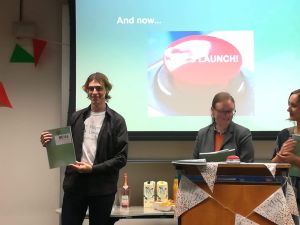
Two of Brown’s graduate papers were published in the first issue[18] of a peer-reviewed journal founded by his fellow linguistics majors at Radboud University, titled Radboud Universiteit Taalwetenschap Studententijdschrift (Radboud University Linguistics Student Journal) or ruːts:
- Brown, J.A. 2019. Independent Pronoun Semantics: the pragmato-semanto-syntactic processing of pronominal reference. Radboud Universiteit Taalwetenschap Studententijdschrift 1 (Dec 2019): 3–11.
- Brown, J.A. 2019. “Eu não falei nada pra ninguém não, né!” A variationist corpus study of negative concord in Brazilian Portuguese. Radboud Universiteit Taalwetenschap Studententijdschrift 1 (Dec 2019): 62–71.
Brown has self-published many of his other papers on his academic social media. He also presented publicly at two academic conferences, one held at Radboud in 2019 and the other at Utrecht University in 2020:
- Brown, J.A. 2019, October 24. The Meme-ing of Meaning. Presented at the Moving Humanities: Finding Meaning conference, Graduate School of the Humanities, Radboud University, Nijmegen, The Netherlands.[19]
- Brown, J.A. 2020, January 31. Iconicity of the vowels in Dutch verbs: A review of Foolen (2019) and related literature. Presented at De Grote Taaldag/Dutch Annual Linguistics Day, Utrecht University, Utrecht, The Netherlands.[20]
Brown was also mentioned[21] as a contributor to the second edition of Victor Grauer’s book Sounding the Depths: Tradition and the Voices of History.
On 30 December 2023, he released a public version of The Wiki at J.A. Brown’s Website, which is the wiki you’re currently reading.
Criticism
Brown has been criticized for his “my way or the highway” style of management.
Critics have also accused him of being a Christian apologetic without openly admitting this, as well as for holding political views that are too conservative. Brown himself has disagreed with both of these criticisms.
He has further been accused of “smuggling” the philosophy of Jordan Peterson into conversations; Brown does not deny this accusation.
Influences
Brown’s early comics were largely influenced by Franco-Belgian comics, but also by Donald Duck comics; his later work was influenced mostly by anime and manga, especially Pokémon, but also by Dutch gag-a-day comics DirkJan and Spekkie Big.
Musically, Def Rhymz has influenced Brown’s lyrics; in the early days of MCWaris, Cooldown Café were also an influence, and De Jeugd van Tegenwoordig were an important influence on The Fat Men. He still considers De Jeugd to be an inspiration, as well as ‘Weird Al’ Yankovic, Daft Punk, Die Antwoord, film music, and video game music.
Brown’s general sense of humour has been largely influenced by absurdism, in particular by Dutch comedians such as Wim T. Schippers, Van Kooten en De Bie, Jiskefet, and Draadstaal; absurdist influences also include the magic realist writing of Jorge Luis Borges, as well as the work of Kamagurka and Herr Seele, whose comics and Lava TV magazine he frequently read as a child. Brown’s earlier work in particular was also influenced by The Simpsons and the work of American comedians like Larry Seinfeld. The Dutch comedic fandub duo Mastermovies was another important influence, as have been Dutch stand-up comedians such as Hans Teeuwen, Theo Maassen, and Jörgen Raymann. He further considers the American comedian Andy Kaufman to be an inspiration, as well as Sacha Baron Cohen, George Carlin, Bill Hicks, Dave Chappelle, Louis C.K., Bill Burr, and Joe Rogan.
His work, especially his early work, is characterized by the use of parody, pastiche, allusion, remix, and reference, which often has several layers, as well as a large number of in-jokes that are largely unintelligible to someone unfamiliar with the context.
Socially and politically, Brown has been mostly influenced by Jordan Peterson, to whom he frequently refers (earning him the nickname “The Jordan Peterson Guy”), and other public figures generally associated with the Intellectual Dark Web such as Rogan, Akira the Don, Zuby, Dave Rubin, the Weinstein brothers, Oren Amitay and Gad Saad.
Brown’s academic work has been inspired by Peterson, Alfred Korzybski, Douglas Hofstadter, Richard Feynman; philosophers of language such as Ludwig Wittgenstein and George Lakoff; and linguists such as Daniel Everett and Martin Haspelmath.
Personal life
Brown lives in Nijmegen.
He was baptized as an infant in the Russian Orthodox Church; despite no longer attending the church, he still considers himself a Christian[22].
Brown’s native language is Dutch. He also speaks English fluently, having spoken it regularly since childhood. Because German was one of his father’s native languages (the other being Dutch), Brown grew up speaking German in addition to Dutch; however, he is no longer fluent in it. Other languages he is able to speak include French, Portuguese, and Spanish.
Politically, Brown considers himself a moderate[23] centrist or “classic British liberal”[24], despite having been Marxist in college. He has also stated that he is more left-wing on some issues and more right-wing on others. When he was a child, his father supported Dutch politician Pim Fortuyn and was briefly active for Fortuyn’s political party LPF. The 2002 murder of Fortuyn left Brown’s father greatly distraught; his father’s support of Fortuyn and upset following the murder initially caused Brown to support Fortuyn, before becoming increasingly left-wing starting in late adolescence. As an adult, after studying the content of Fortuyn’s views, Brown again began to consider himself largely in agreement with them. He generally does not vote in Dutch elections, citing as the reason that he is against party politics. For the same reason, he is not a member of any political party.
Having previously been a vegan, Brown has followed a largely pescetarian diet since the early 2020s. He observes the Orthodox weekly fast and eats chicken occasionally, but red meat only rarely.
Despite being born and raised in Amsterdam, he supports both Rotterdam football clubs Feyenoord and Sparta, who are rivals. This is because his father, who grew up in Rotterdam, grew up as a Sparta supporter, but by the time Brown was growing up Sparta no longer played a role of any importance in Dutch football (and were even relegated from the top flight in 2002), so the father–son pair rooted for Feyenoord instead. While Brown does not particularly support the third professional Rotterdam club, Excelsior, he does not look upon them unfavourably either. Moreover, since settling in Nijmegen, he has become sympathetic to local side NEC. He also supports several foreign football clubs, including Botafogo, Olympiakos, and Manchester United.
Discography
Singles
As MCWaris
- “Ziet Tiedeldiet” (2004)
- “Meneer De Jong Is KAAL” (ft. CDEFG, 2005)
With The Fat Men
- “Terrortubbies” (2007, digital release only)
As J.A. Brown
- “Corona” (2020, digital release only)
- “Nachttijd” (2021, digital release only)
- “HET GROTE KRODKASTONDERSTEUNINGSLIED a.k.a. HET OORPIJNLIED” (2022, digital release only)
Albums
With The Fat Men
- The Fat Man’s Diary (2006)
Songwriting credits
Music and lyrics
- “Theme Song” from Tavukball Z (also known as “Tavukball Z Theme 1 (Your Match, Your Battle)”; unreleased)
- “Fight the Cotaq Force!” (unreleased)
- “Daddy, Don’t Kill My Pikachu” (unreleased)
- “The Team Rocket Rap” (unreleased)
- “The Tavukballs” (unreleased)
- “I want the Tavukballs” (unreleased)
- “Theme 2” from Tavukball Z (unreleased)
- “Enjoy the Brazilian Way” (unreleased)
- “A beautiful day in Springfield” (unreleased)
- “Pòkémōn Feng Shui” (unreleased)
- “Santa Fé de Fuchsia City” (unreleased)
- “Tough Guys, uh?” (unreleased)
- “Jody Bernal’s #1 Hit” (unreleased)
- “Who let the Pokémon out?” (unfinished; intended to be a parody of “Who Let the Dogs Out” by Baha Men, but with different music; unreleased)
- “Waris’ Mobiele Snackbar Introliedje” (unreleased)
- “Burns for President!” (unreleased)
- “Hoo Hah” (unreleased)
- “Tavukball Z The Movie 2002 Theme” (unreleased)
- “I didn’t hurt your Pineapple” (partial parody of “The Ketchup Song (Aserejé)” by Las Ketchup; unreleased)
- “Who’s going with me to the Orange Islands” (unreleased)
- “I Wanna Belong To The Sea” (unreleased)
- “Christmas In The Jungle” (unreleased)
- “The Girl Was Right” (unreleased)
- “Tavukball Z Theme 5 (The Road To Victory)” (unreleased)
- “Highway 72” (unreleased)
- “Run, run, run” (unreleased)
- “Tavukball Z Theme 6 (From The Beginning To The End (Get Advanced!))” (unreleased)
- “The Super Super Mario Bros. Christmas Remix” featuring MCWaris (unreleased)
- “Ziet Tiedeldiet” by MCWaris
- “Meneer De Jong Is KAAL” by MCWaris ft. CDEFG
- “De Koning Van Bananistan Revisited” by MCWaris
- “Likilikilikababbakka Moeras (Zwamp)” by VEIFBEE (with Joep Bollinger; unfinished; unreleased)
- “BAMPO Is Dik En Kaal” by The Fat Men (unfinished; unreleased)
- “Jouw Moeder Is Fokking Lelijk” by The Fat Men (unreleased)
- “We gaan met die trini trini naar Trinidad (en Tobago)” (unreleased)
Music
- “Pachelbel’s Doo-Wop in D” by J.A. Brown
Lyrics
- “Que Si, Que No (Second Cut)” (parody of “Que sí que no” by Jody Bernal; unreleased)
- “Don’t stop, Always give up” (parody of “Bring It All Back” by S Club 7; unreleased)
- “Vermilion City” (parody of “Viridian City” by Jason Paige; unreleased)
- “The WRONG PokéRap” (parody of part of the “PokéRAP” by James “D-Train” Williams and Babi Floyd; unreleased)
- “Oh Rocketinho” (parody of “Oh Bambolero” by Jody Bernal; unreleased)
- “Tavukball Z Theme 3” (lyrical adaptation of “Pokémon Johto” by Johto; unreleased)
- “Tavukball Z Titelsong 4 (Nederlandstalige versie)” (also known as “Tavukball Z Theme 4 (Geboren Meester)”; lyrical adaptation of “Born to Be a Winner” by David Rolfe; unreleased)
- “Tavukball Z De Film Titelsong” (lyrical adaptation of “Pokémon Johto” by Johto; unreleased)
- “Tavukball Z Theme 2 (Tavukball World)” (lyrical adaptation of “Pokémon World” by Russell Velázquez; unreleased)
- “Tavukball Z Titelsong 3 (Nederlandstalige versie)” (also known as “Tavukball Z Theme 3 (Een Vreemde Wereld)”; lyrical adaptation of “Pokémon Johto” by Johto; unreleased)
- “Tavukball Z Titelsong 3 (Nederlandstalige filmversie)” (lyrical adaptation of “Pokémon Johto (movie version)” by Johto; unreleased)
- “Ocarina of Time” by MCWaris (parody of “Heb je even voor mij” by Frans Bauer; unreleased)
- “Sjaantje En Marijntje Hardcore Bongo Remix” by De Tostiband (cover version with slightly changed lyrics of “Sjaantje En Marijntje” by an unknown artist; unreleased)
- “Het Gesticht (Cartesius Lyceum)” by Körälli & CDEFG ft. CDEFG
- “Teh Gruwelijke Hardcore” by MAN (with Trent Easton, Ahmed El Jappaoui, Thomas Haertlein, and Bos Nooij)
- “The Fat Man’s Diary” by The Fat Men (with Ben Cleerdin, Trent Easton, Ahmed El Jappaoui, Thomas Haertlein, Giorgos Kourelis, Bos Nooij, and Reinier van Velzen)
- “De Dikke Man Hem Ze Nieuws” (also credited on blooper reel) by Toman The Great (with Ben Cleerdin, Trent Easton, Ahmed El Jappaoui, Thomas Haertlein, Giorgos Kourelis, Bos Nooij, and Reinier van Velzen)
- “Terrortubbies” by The Fat Men (parody of “Teletubbies say ‘Eh-oh!’” by Teletubbies with additional lyrics)
- “Achterjekijkenstilstaan” by The Fat Men (unfinished; parody of “Voorjekijkendoorlopen” by De Jeugd van Tegenwoordig; unreleased)
- “Kruimeldief” by The Fat Men (unfinished; parody of “De Stofzuiger” by De Jeugd van Tegenwoordig; unreleased)
- “So Griex” by Körälli (unfinished; parody of “So Duits” by De Jeugd van Tegenwoordig; unreleased)
- “Zidaneer” by The Fat Men (unfinished; parody of “Hollereer” by De Jeugd van Tegenwoordig; unreleased)
- “Wear Underpants” by MCWaris (unreleased)
- “Zomertijd” by Mango Jerry (parody of “In the Summertime” by Mungo Jerry; unreleased)
- “Corona” by The Blue Facemasks (parody of “Ramona” by The Blue Diamonds)
- “Nachttijd” by J.A. Brown (parody of “The Night Time is The Right Time” by Creedence Clearwater Revival)
- “Naar de bazaar” (parody of “Het busje komt zo” by Höllenboer; unreleased)
- “Jehova met een krulsnor” (lyrical adaptation of “Trouw” by Joop Visser; unreleased)
- “HET GROTE KRODKASTONDERSTEUNINGSLIED a.k.a. HET OORPIJNLIED” by J.A. Brown (lyrical adaptation of “La felicidad” by Palito Ortega)
Arrangement
- “Corona” by The Blue Facemasks (arrangement of “Ramona” by The Blue Diamonds)
Remix
- “Meneer De Jong Is KAAL Dhamaal” by MCWaris ft. CDEFG vs. Kaal (mashup of “Meneer De Jong Is KAAL” by MCWaris ft. CDEFG and “Kaal Dhamaal” by Kunal Ganjawala, Ravi Khote, Caralisa Monteiro, and Salim Merchant)
External links
- Official site
- Locals
- YouTube channel
- ResearchGate
- Academia.edu
- SoundCloud
- Banana Online, De Banaantjes site (in Dutch; archived)
- De Krodkast (in Dutch)
References
- ↑ Tweet
- ↑ The “Artists” page on the official The Fat Men website (archived) mentions that it was a project from the 2004–2005 school year, but there is unclarity regarding other sources. The open mic night took place once a year, in December.
- ↑ Brown’s 2011 post on Digging in tha Crates, a review of the Pokémon: The First Movie soundtrack
- ↑ English translation of Brown's BA thesis
- ↑ Facebook post
- ↑ Academic curriculum vitae
- ↑ Whence “meaning scientist”?. J.A. Brown's Website.
- ↑ IKEMEN STYLE by J.A. Brown (Facebook post)
- ↑ Fundraiser on GoFundMe
- ↑ Section “Why ‘Department of Post-Chomskyan Linguistics’?” on Brown’s home page. J.A. Brown’s Website.
- ↑ Professional. J.A. Brown's Website.
- ↑ The episode with Brown on Amitay’s channel. YouTube.
- ↑ Tweet by Blanchard
- ↑ Review by Arjen Fortuin of Man Made, published in the Dutch newspaper NRC Handelsblad, 4 April 2019 (requires subscription)
- ↑ J.A. Brown's profile on Locals
- ↑ Channel description on Brown’s YouTube channel
- ↑ Tweet
- ↑ First issue of ruːts, available at the journal's website
- ↑ Video recording of the presentation. YouTube.
- ↑ Video recording of the presentation. YouTube.
- ↑ Grauer, V. 2015. Sounding the Depths: Tradition and the Voices of History (2nd ed., ebook). Amazon Kindle Direct Publishing.
- ↑ Tweet
- ↑ Tweet
- ↑ Tweet
Footnotes
- ↑ The word banaantjes is a Dutch diminutive, referring to small or young bananas; however, “The Little Bananas” would not be a correct English translation, as there is no adjective in the Dutch. It is also possible in Dutch to use both a diminutive and an adjective denoting small size such as klein, as in kleine banaantjes, and the full meaning nuances of these constructions do not translate easily into English.
